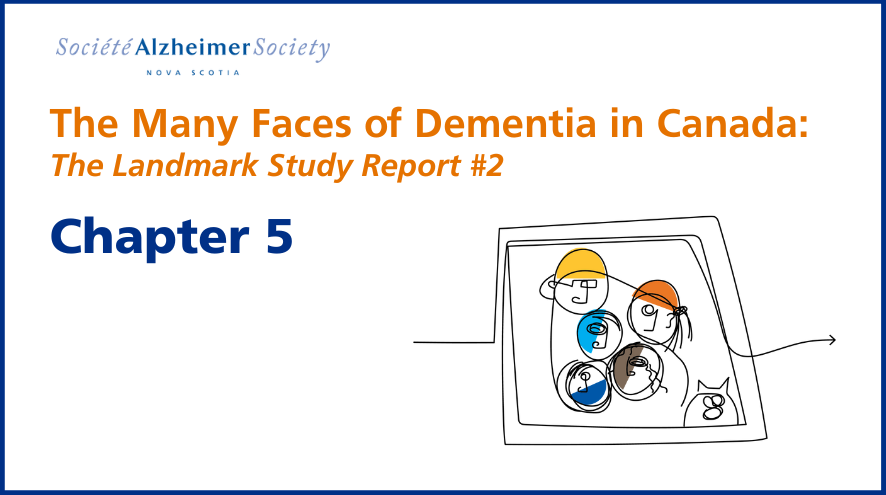Chapter 5: Young Onset Dementia: Distinct Challenges
Learn more about Chapter 5 of the second volume of the Landmark Study, the Many Faces of Dementia in Canada, a report by the Alzheimer Society of Canada.

The onset of dementia can be a challenge at any age, but when dementia symptoms develop in younger adults, it presents an overlapping range of unique challenges.
“Young onset dementia” is the term used when dementia symptoms develop before the age of 65. It is a relatively new term that has replaced “early onset dementia.” This change in terminology occurred because “early onset” can be confused with “early-stage dementia.” Internationally, some also use the term “young dementia.”
Although the term may be new, the phenomenon of young onset dementia is not—in fact, two of the first patients who helped Dr. Alois Alzheimer identify the condition we now know as Alzheimer’s disease in the early 1900s, Auguste D. and Johann F., were patients who developed symptoms in their 50s. (Hippius & Neundörfer, 2003; Klünemann et al., 2002). It is in part by seeing these patients and their dementia symptoms, and examining their brains after their deaths, that Dr. Alzheimer and his colleagues identified the hallmarks of Alzheimer’s disease.
Nonetheless, with age as the strongest risk factor for dementia, most cases of dementia continue to be seen in older adults past the age of 65—a phenomenon which has overwhelmingly driven care and research priorities, to the detriment of younger adults with dementia.
Most dementia care, for instance, is typically organized and designed for people in their 70s and 80s (Chemali et al., 2012; Cations et al., 2017). Research on dementia has also primarily focused on older adults and their challenges and care needs. Canada’s national dementia strategy recognizes that people with young onset dementia are a group that faces numerous barriers to equitable care (Public Health Agency of Canada, 2019).
The onset of dementia can be a challenge at any age, but when dementia symptoms develop in younger adults, it presents an overlapping range of unique challenges:
- the large variety of potential symptoms and their causes, which can lead to delayed diagnosis
- lack of awareness among many health-care workers about the existence of young onset dementia, which also leads to delayed diagnosis
- the unique care needs directly resulting from the time in the life course where the symptoms develop, for instance, the need to make sure school-age caregivers are supported or that active-lifestyle day programs are available
- the financial challenges many may experience if they have not been able, given their age, to accrue substantial retirement savings or pension access
- the additional financial challenges that adults living with disability face; for instance, 16.6% of people with disability in Canada live in poverty compared to 11% for the overall population (Government of Canada, 2020)
- the practical challenges of obtaining proper workplace accommodations for disability, particularly for issues that take years to diagnose (Morris, 2019)
With the number of persons with young onset dementia in Canada rising (Alzheimer Society of Canada, 2022) and with increasing dementia advocacy for all ages in Canada often being driven by people who have had young onset, this condition is now becoming more recognized as a growing public health challenge separate from the late-onset version of dementia.
In this chapter, we will briefly review young onset dementia and the distinctive challenges for both individuals and their care partners. We will conclude the chapter with some projections from the Landmark Study for the number of people who might develop young onset dementia by 2050 in Canada.
Read this full chapter here.
